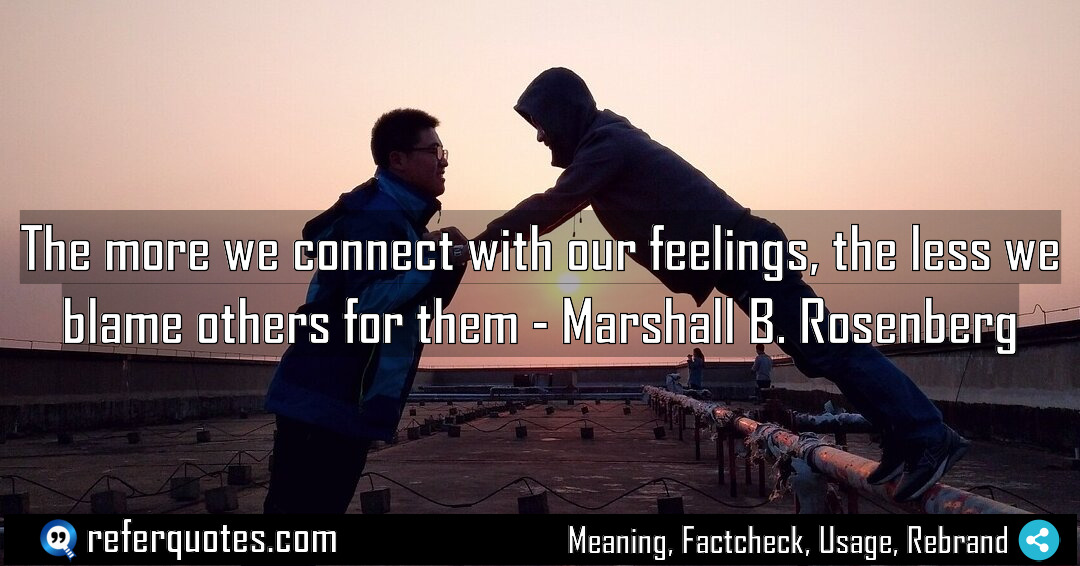
You know, “The more we connect with our feelings” is one of those simple truths that completely reframes how we handle conflict. It shifts the power from trying to control others back to understanding ourselves, which is where real change begins. It’s a game-changer for personal and professional relationships alike.
Share Image Quote:
Table of Contents
Meaning
The core idea is that emotional self-awareness is the ultimate antidote to blame. When you truly understand what you’re feeling, the need to point a finger at someone else just… evaporates.
Explanation
Let me break it down. Most of us are walking around with this default setting: something happens, we feel bad, and we immediately look for the external cause. “You made me angry.” “You hurt my feelings.” It’s a reflex. But what Rosenberg is saying—and I’ve seen this play out a thousand times—is that the moment you pause and genuinely connect with that feeling of anger or hurt, something shifts. You stop being a victim of someone else’s actions and start being the agent of your own emotional state. You realize the feeling is a signal about a need of yours that isn’t being met, not a verdict on someone else’s character. It’s the difference between “You’re so inconsiderate for being late!” and “When you’re late, I feel anxious because I have a deep need for reliability and respect.” See the shift? The first one is an attack. The second is an invitation to connect. It’s profound.
Quote Summary
Reading Level62
Aesthetic Score83
Origin & Factcheck
This wisdom comes straight from Marshall B. Rosenberg’s 2005 book, Raising Children Compassionately. It’s a core tenet of his Nonviolent Communication (NVC) framework. You sometimes see similar sentiments floating around, but this specific phrasing is Rosenberg’s. He developed NVC in the United States, and his work has become the definitive source for this kind of compassionate communication.
Attribution Summary
Where is this quotation located?
| Quotation | The more we connect with our feelings, the less we blame others for them |
| Book Details | Publication Year/Date: 2004; ISBN/Unique Identifier: 9781892005140; Last edition: PuddleDancer Press, 1st Edition, 48 pages. |
| Where is it? | Chapter: Taking Responsibility for Feelings, Approximate page from 2004 edition |
Context
It’s crucial to remember he wrote this in a parenting book. He’s applying this high-level, transformative concept to the most emotionally charged environment many of us will ever know: raising kids. If you can learn to do this when your toddler is having a meltdown in the supermarket, you can do it anywhere. It reframes the entire parent-child dynamic from one of control to one of mutual understanding.
Usage Examples
So how do you actually use this? Let’s get practical.
- In a Team Meeting: Instead of saying, “Your report being late threw off my entire schedule,” you could reflect and say, “When I don’t have the report on time, I feel stressed because I need clear timelines to do my best work.” It’s not weak; it’s strategic and builds respect.
- With a Partner: Instead of the classic, “You never listen to me!” you might find, “When I’m sharing something and I see you on your phone, I feel disconnected, and I really value feeling heard by you.” This opens a door instead of slamming one shut.
- For Leaders & Managers: This is pure leadership gold. It transforms feedback from personal criticism to constructive, needs-based dialogue that actually gets results.
To whom it appeals?
Share This Quote Image & Motivate
Motivation Score72
Popularity Score78
Shareability Score79
FAQ
Question: Does this mean I should never hold others accountable for their actions?
Answer: Not at all! It’s the opposite. This is about creating *effective* accountability. Blame puts people on the defensive and shuts down conversation. Expressing your own feelings and needs clearly makes it much more likely the other person will actually hear you and change their behavior.
Question: What if my feeling *is* actually their fault? They did a terrible thing.
Answer: This is the toughest part to grasp. It’s not about excusing bad behavior. It’s about empowering yourself. Blame keeps you tied to the person who “caused” the feeling. Understanding your feeling and the need behind it gives you back your power to choose your response, whether that’s setting a firm boundary, leaving the situation, or seeking reconciliation.
Question: This feels really hard to do in the heat of the moment. Any tips?
Answer: It’s a muscle you build. Start by practicing in low-stakes situations. The key is that tiny pause. Before you react, just take one breath and ask yourself, “What am I *really* feeling right now? And what do I need?” That one-second intervention changes everything.
Similar Quotes
Humans need to feel connected to others, and that connection isn’t just a nice-to-have. It’s a deep, psychological imperative that often gets activated most powerfully when things fall apart. When…
Sebastian Junger’s insight that “We are social creatures by nature…” hits on a profound truth about human psychology. It explains why isolation and a lack of community can be so…
You know, “The more we empathize, the less we criticize” is one of those ideas that seems simple but completely flips your perspective. It’s about shifting from judgment to understanding,…
Blame and judgment disconnect us from compassion. It’s a simple but profound truth that, once you see it, changes how you interact with everyone. This idea is the absolute bedrock…
When we listen for needs instead of faults, we unlock a profound shift in our relationships. It’s about moving from blame to understanding, from conflict to connection. This simple change…
